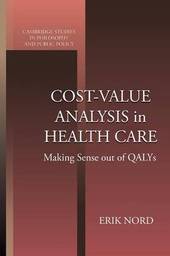
|
Cost-Value Analysis in Health Care: Making Sense out of QALYS
Paperback / softback
Main Details
| Title |
Cost-Value Analysis in Health Care: Making Sense out of QALYS
|
| Authors and Contributors |
By (author) Erik Nord
|
| Series | Cambridge Studies in Philosophy and Public Policy |
|---|
| Physical Properties |
| Format:Paperback / softback | | Pages:182 | | Dimensions(mm): Height 229,Width 152 |
|
| Category/Genre | Ethics and moral philosophy |
|---|
| ISBN/Barcode |
9780521644341
|
| Classifications | Dewey:362.10681 |
|---|
| Audience | | Tertiary Education (US: College) | | Professional & Vocational | |
|---|
| Illustrations |
17 Tables, unspecified; 5 Line drawings, unspecified
|
|
Publishing Details |
| Publisher |
Cambridge University Press
|
| Imprint |
Cambridge University Press
|
| Publication Date |
28 September 1999 |
| Publication Country |
United Kingdom
|
Description
This book is a comprehensive and fully up-to-date account of what it means to try to quantify health in distributing resources for health care. It examines the concept of QALYs (Quality Adjusted Life Year) which supposedly makes it more accurate to talk about life in terms of both quality and quantity of years lived when referring to health care policy. It offers an elegant new approach to comparing the costs and benefits of medical interventions. Cost-Utility Analysis (CUA) is a method designed by economists to aid decision makers distribute scarce resources to areas of health care where they will yield the greatest benefits. Erik Nord questions the feasibility of measuring patients' quality of life meaningfully in numerical terms, as CUA presupposes. He presents an alternative approach called cost-value analysis in which representative samples of the general public express preferences between different health-care programs. In this approach, subjects are allowed to include concerns for fairness that go beyond concerns for efficiency of conventional health economics.
Reviews'Nord is at the forefront of thinking about the best way to allocate health care efficiently and equitably, and he has extensive knowledge of the empirical research being done in this area. Anyone interested in the ethical problems of heath care allocation - especially anyone interested in the fundamental question of what health care allocation should be trying to achieve - will benefit from reading this book.' John McKie, Bioethics
|